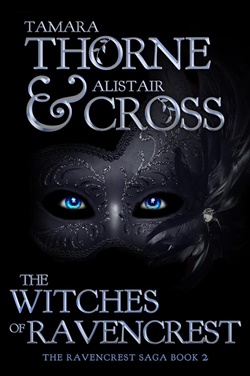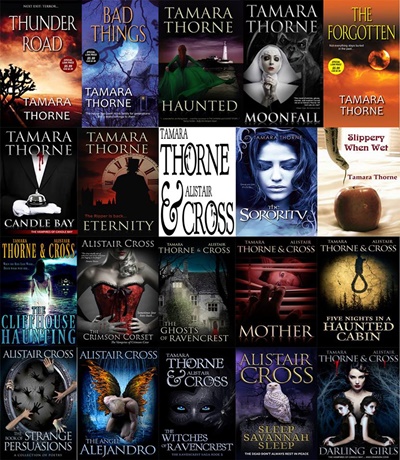6 Tips for Collaborating

The Witches of Ravencrest, the second book in The Ravencrest Saga, is now available in ebook and will soon appear in paperback. The novel continues the story begun in The Ghosts of Ravencrest, following the adventures of young governess Belinda Moorland, who seems to have a penchant for attracting ghosts … and witches. We both love gothics, having independently teethed on Daphne DuMaurier’s sublime gothic, Rebecca, indulged in Dark Shadows, and read every 70s and 80s gothic novel we could get our sweaty little hands on.
In The Ghosts of Ravencrest, Belinda met her employer, rich, handsome zillionaire, Eric Manning, along with his mysterious butler, Grant Phister, Grant’s metabolically-amazing husband, Riley, a gaggle of peculiar maids, and Mrs. Cordelia Heller, a witchy Mrs. Danvers who makes Endora look like a saint. In addition, Belinda also got involved with a number of ghosts and other strange creatures like a trio of bleeding nuns with a thing for persimmons, and a deformed harlequin who scuttles through the walls pining for the governess.
In The Witches of Ravencrest, Belinda has come to grips with the fact that Ravencrest Manor – imported stone by stone from England two centuries ago – is brimming with ghosts – but now she’s faced with more disturbing creatures, from a serial killer to stray zombies, and a boatload of witches. As the annual Harvest Ball approaches, she meets the Devilswood Historical Society. Known as The Pastels, these women have more brewing than history and Belinda finds herself caught in the middle of a witchy war between the Pastels and Mrs. Heller. And to top it off, there’s the ghost of Rebecca Dane Manning, a spirit who insists that heads will roll if Belinda doesn’t avenge her. In the midst of all this, the relationship between Belinda and Eric Manning is heating up.
We had so much fun writing this novel that we’re already beginning the third in the series, The Ravencrest Saga: Exorcism. We’re having a blast brainstorming the book are are itching to get started.
The Witches of Ravencrest is our fourth collaborative novel and now that we’ve proven our successful collaboration is no fluke, we’re ready to answer a few of the many questions readers and writers ask us about our partnership.
It turns out that many, many writers are considering collaborating but are concerned about how well it will work. Writers – and readers – want to know how we divide up our work and maintain a good working relationship while doing what is, admittedly, a very stressful job.
We’ll try to shed a little light on the art of collaboration.
Collaborating: What to Do, What Not to Do
We’ve been collaborating for almost five years now and we can tell you it requires more than just two writers deciding to work together. It requires commitment, honesty, loyalty, respect, and a sense of humor.
1. Commitment is Vital.
Collaborators share more than a story: they share a dream that, in order to be fulfilled, requires mutual commitment. You both must be on board to work hard, do your share, and take responsibility for your own contribution. We work by Skype, in the Cloud, continuously collaborating, but if you work another way – say, writing alternate chapters or following separate characters – you must still do your fair share. That is not to imply that there won’t be times when one of you does more writing than the other – there are days when fire strikes for each person, and days when it doesn’t. We often have sessions when one – or the other – of us – does the lion’s share of the work, and that’s fine because we both know the situation will reverse itself very quickly. We always achieve that 50/50 split without sweating the small stuff or worrying about what our partner is doing. Our commitment is equal, as is our trust. You must be able to trust your collaborator. Be sure of that before you begin.
2. Honesty: Stow Your Ego at the Door.
It’s important to be able to say to your collaborator, “That could be better,” or “Maybe we should do it another way,” without meeting resistance. Collaborators must be able to discuss anything and everything. Mind games and guilt trips are not allowed, nor are they necessary when you and your partner are adept at being ‘on the same page.’ In our case, we generally work simultaneously in the same file, usually in the same scene and our styles mesh so well that we don’t know who wrote what; that’s the best because you can criticize – and complement – without any worry. But even when we do know who wrote what – after all, we edit and read for each other in our solo works – it’s just fine. We have only each other’s best interests at heart and we both know it. Jealousy must be a non-issue.
And if you work as closely as we do – spending hours and hours together daily, you need lots of personal honesty because you’re probably never going to be closer to another human being save for your spouse. For example, if you have to leave the computer every five minutes, don’t bother being coy. You don’t have to go into detail, but tell your collaborator you’re under siege by a bad burrito. He or she will understand. Believe us, honesty pays off – and will probably result in some great jokes.
3. Loyalty: No Selling Out Your Collaborator.
Why loyalty? Because, once you’re successful, others might (a) try to turn you against each other, (b) try to convince you to collaborate with them, or (c) both.
If you’ve ever been around children, you know that they will try to play their parents against each other. They’ll ask Mom for permission to go to the movies, and if she says no, they ask Dad, without mentioning Mom said no. Attentive parents always consult one another, thereby negating the manipulation. Writers beware: some people will do exactly the same thing to you and your collaborator. That’s why the two of you must be honest and totally transparent with each other. It’ll stop manipulators in their tracks. Good collaborating means that if someone approaches one of us with anything provocative – anything – be assured both partners will know about it.
4. Respect – Sock it to Me!
While it’s true that the famous creative team, Gilbert and Sullivan, didn’t get along well, they managed to create amazing comic operas. You can, too, if you can keep your collaboration fundamentally business-like, but would you want to work with someone you can’t stand? We wouldn’t – if you’re going to work with people you hate, you might as well work somewhere that will provide a more reliable source of income.
Gilbert and Sullivan lacked mutual respect, each feeling that their work was subjugated by the other’s. Each believed he was better than his partner.
We can’t imagine working this way. When we write together, we’re one entity, not two. We are partners, 50-50 in all ways, and see each other’s strengths and weaknesses as equal. They balance us and make our stories better. One of us may be better at one thing, but you can bet the other excels at something else. Not only do we rejoice in each other’s strengths, we help each other with our weaknesses. There’s no room for jealousy and criticism in our partnership; only mutual support, respect, and loyalty. We believe this is vital to an enduring collaborative team, just as it is to an enduring friendship. We cherish both and encourage you to look for the same.
5. Similar Personalities: Viva le non-Difference.
While some differences make for better partnerships, having similar personalities is a boon for us. Our differences? Alistair keeps the very ADHD Tamara focused. Tamara, in turn, keeps Alistair from getting too intense. Otherwise, we’re virtual twins in everything from our preferences in storytelling (eerie atmosphere, big casts, third person narratives, complicated plots and subversive humor) to our philosophies and outlooks on life. And, of course, our love of cats.
Working with an opposite personality sounds like fun on the surface, but it often leads into murky waters. We are both “nice” sorts – we don’t tell each other what to do, we both despise drama, and we both want to have a pleasant work experience. All the items listed above help us achieve those things on a daily basis.
So what do we hate? Working with a writer who constantly tells you that you must write a certain way – in first person, for example – is an exercise in annoyance. That’s very different from suggesting to your collaborator that it might be fun to try a first person project.
Working with someone who cries and whines and takes offense because you suggest getting rid of an unnecessary character will do nothing except, perhaps, improve your understanding of crying, whining characters and help you imagine new ways to do them in. Never write with someone who uses guilt to manipulate you. Unfortunately, it’s a very common problem.
Working with someone who constantly cries and whines because they are intimidated by your prowess in a certain area. One of us had an early collaborator who, quite literally, cried when they read our dialogue-filled scenes because they weren’t as adept at dialogue. Telling this person that they excelled at plotting in order to make them stop feeling sorry for themselves merely resulted in them flinging threats and insults when the partnership ended. The person told people that we would never be able to write another book because we couldn’t plot on our own. *insert eyeroll here* – it’s often true that no good deed goes unpunished. If you enjoy drama, write with someone who enjoys it as well, but please don’t try to connect with someone who appeals to you because they’re steady and easy-going. Easy-going types tend to put up with a lot in order to keep the peace, but make no mistake – they will reach their limit and dump you.
6. A Sense of Humor: If You Don’t Laugh, You Cry
Writing, especially collaborative writing, is hard work. Hard work is stressful and if you don’t have a sense of humor about what you do, you’ll likely crash and burn. You both need humorous sensibilities – otherwise one of you will drag the other down and hard feelings will surface. Share jokes, share responsibility, share respect and commitment – and be loyal to one another. Do all these things, and you might be as fortunate as we are! We wish you luck!






